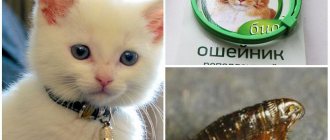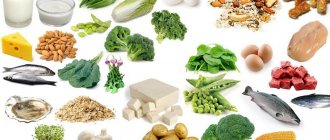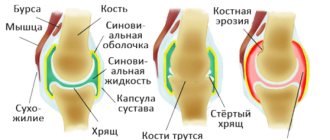What it is
This is a deficiency of vitamins in the body. There may be a lack of one element or a whole complex, so the disease manifests itself in different ways.
Types and classification of vitamin deficiency
Mild pathology is called hypovitaminosis; it is not easy to identify it right away. And the complete absence of useful substances is vitamin deficiency. It manifests itself sharply and in severe form.
The animal is not just sick.
Due to the lack of essential vitamins, vital body functions may fail. A nutritional deficiency of vitamins can be caused by poor nutrition.
Endogenous (complete) deficiency of nutrients is a secondary symptom that occurs against the background of various problems affecting the body.
The value of vitamin B1
Lack of vitamin B1 (thiamine) causes damage to the nervous system, manifested in convulsions with vomiting, trembling, fearfulness, paresis, and hormonal imbalance. The dog experiences digestive disorders (constipation or diarrhea), and there is a loss of appetite. In severe cases, progressive atrophy of muscle tissue appears. Treatment of B1 vitamin deficiency is carried out with multivitamins and carboxylase.
Reasons for the development of pathology
Vitamins enter the body with food. With a balanced diet, this problem does not arise.
If the dog is fed monotonously, it is difficult for the body to maintain immunity.
The main factors provoking vitamin deficiency
| Causes | Peculiarities |
| Infections | Plague, viruses, chlamydia, mycoplasmosis, leukospirosis, etc. – serious diseases on which the immune system spends a lot of energy. If they are not replenished, vitamin deficiency will develop |
| Gastrointestinal problems | The lack of a balanced diet causes the development of pathologies of the digestive system, which makes vitamins poorly absorbed |
| Medicines | Some medications not only treat, but also disrupt body functions. Specific drugs prescribed to destroy pathogenic microbes also kill beneficial microflora. But it is she who is responsible for the synthesis of important vitamins |
Worms, ticks, insect bites and other similar problems can worsen your pet's condition.
The immune system perceives any illness as a threat and activates all its resources. At the same time, nutrients produced in the body are also consumed.
During what periods does exacerbation occur? The state of the body is influenced by seasonality.
When transitioning from a warm period to a cold one, your pet needs additional strength to shed. Therefore, autumn is the most difficult period for dogs in terms of strengthening their immunity.
In the spring, it is also worth paying attention to the animal, because during the winter, with a deficiency of ultraviolet radiation, a lot of effort was spent to withstand the cold.
Who's at risk
The problem depends not only on external factors. Deficiency also develops against the background of physiological characteristics:
- when a puppy grows up, turning into an adult dog, special nutrition is needed, enhanced by an additional set of vitamins and minerals, otherwise these elements will be absorbed from tissues and organs;
mating in dogs is a period of vigorous activity and high nervous tension: sexual heat requires additional resources, so during this season you need to not only take care of high-quality nutrition, but also introduce all kinds of additives into the diet;- Bitches must eat intensively while carrying and feeding puppies: with a lack of necessary substances, vitamin deficiency develops not only in the mother, but also in the puppies.
The animal body (like the human body) suffers from all kinds of stress. To make your pet’s life easier and to raise a healthy, active dog from a puppy, you need to organize the correct diet for your pet, based on its physiological characteristics.
Prevention
Prevention of vitamin deficiency - a balanced diet and giving multivitamin complexes, especially closer to spring, when the animal’s body is deficient in vitamins and minerals. It is necessary to treat all diseases and prevent infection with worms.
The age-old debate is which is better, ready-made food or homemade food. Experts tend to trust dry pellets, but only with the caveat: “ready-made food meets all requirements while maintaining the full composition.” This is premium and super premium food; what is sold under the “economy class” label does not always meet quality requirements.
Feed is stored under certain conditions and for a set amount of time in sealed packaging. When weighed, they quickly lose their valuable properties.
Prevention of vitamin deficiency in a pet is entirely the responsibility of the owner. It is important that the dog spends time in the fresh air and receives the required nutrients and microelements!
First signs and symptoms
Each element that enters the body (or is produced by it) has its own functions. A deficiency of one or another vitamin will manifest itself in certain ways. Knowing the symptoms makes it easier to correct the problem.
Lack of B vitamins (B2, B5, B6, B12)
The substances included in this category are especially important for the dog’s body - without them, metabolic processes are disrupted. Vitamins of this group also affect hemoglobin levels.
A slight lack of components can be judged by the condition of the coat: it looks faded, lifeless, becomes matted and falls out.
When true vitamin deficiency develops, the nervous system is affected. The animal becomes exhausted and its coordination of movements is impaired. In severe forms, convulsions are possible.
Deficiency of vitamins C, D, E and K
Without these substances it is difficult to imagine the normal functioning of internal organs. It is enough for a dog to lack at least one of the elements, and the pet will begin to have serious health problems .
What does vitamin deficiency lead to?
| Vitamin | What does it affect? | Main symptoms of deficiency |
| C | Supports the immune system, gastrointestinal tract and liver function |
|
| D | Important during growth – helps the development of the musculoskeletal system |
|
| E | Has antioxidant properties and is responsible for the functioning of the reproductive and cardiovascular systems |
|
Vitamin K is responsible for blood quality. Its deficiency leads to clotting disorders. But signs of a problem appear when your pet gets hurt and bleeds.
How to understand that you do not have enough vitamin A
If the animal is lethargic, apathetic, eats poorly or refuses food altogether, it may have been poisoned. But retinol deficiency should not be ruled out.
Associated symptoms:
- rapid or, conversely, prolonged molting;
- dull coat;
- deteriorated vision;
- dental problems.
A lack of vitamin A is dangerous for a growing body. The skeleton will not form correctly, or growth will slow down significantly.
How to distinguish from lichen
Hair loss is also observed with lichen. But in this case, alopecia occurs only in the area where the villi are damaged by fungal spores, so it is not difficult to distinguish a lack of vitamins from deprivation.
When there is a deficiency of nutrients, the entire coat suffers. But skin disease sometimes becomes a problem accompanying vitamin deficiency, manifesting itself as bald spots on the skin.
Additional symptoms
Complex vitamin deficiency is manifested by summary symptoms.
It is worth adding to the already known ones:
- the pet stops gaining weight and quickly loses weight;
- problems with bowel and bladder emptying begin;
- the mood is constantly changing: either the dog is completely phlegmatic, or suddenly becomes aggressive.
Any change in an animal’s behavior is a signal to pay attention to its health. Eliminating the problem gives a quick positive result only if therapy is started in a timely manner.
Hypervitaminosis as a consequence of self-medication
The disease occurs if the body suffers from an excess of vitamins. Dogs that receive monotonous food are prone to this pathology. If a dog has vitamin deficiency, the breeder cannot treat the dog on his own, this leads to dangerous consequences! Incorrect dosages of drugs cause hypervitaminosis and poisoning. It is necessary to ensure that the diet is balanced. If your pet eats natural food and requires it to be enriched with special additives, you should consult your doctor before purchasing them!
Why is hypervitaminosis dangerous? The disease significantly undermines health. The pet's hair begins to fall out, bone structures are affected, and diarrhea occurs periodically. The most dangerous complication is intoxication. Taking too little vitamins can be fatal! If there is an excess of vital components, salts are deposited in the kidneys and liver.
Hypervitaminosis of vitamin D leads to exhaustion, dysfunction of soft tissues and the musculoskeletal system. If there is an overdose of vitamin B1, the animal trembles and the heartbeat quickens. Excess nicotinic acid is very harmful, in this case liver pathologies may occur. If there is too much vitamin C in the body, the animal will experience diarrhea.
Now we know how vitamin deficiency manifests itself in a dog. Let us note once again that treatment is not complete without diet. If treatment is started early, complications can be prevented. Hypervitaminosis is more difficult to treat; therefore, it is important to ensure the prevention of this disease.
Effective treatment
Signs alone are not enough to determine a deficiency of specific vitamins; confirmatory tests are necessary. Therefore, it is better to go to the veterinarian for treatment.
The doctor will examine the dog’s condition and prescribe a separate drug in the form of tablets, injections, or select a multivitamin complex.
In case of a complex type of vitamin deficiency, it is necessary to simultaneously treat the underlying disease. Without this, it is not possible to correct the pet’s condition.
How to help at home
When thinking about how to treat vitamin deficiency at home, first of all, the dog owner should review the animal’s menu. Some products help replenish the substances the body lacks.
What to include in the diet for vitamin deficiency
| Vitamin | What products contain |
| Group B | Meat, offal, eggs, cabbage, spinach, meat and bone and fish meal |
| A | Dairy products, egg yolks, butter, spinach, carrots, fish oil |
| C | Potatoes, spinach, cabbage, lettuce |
| D | Fish oil, meat and bone meal, eggshells |
| E | Vegetable oils, wheat germ |
| K | Greens, fishmeal |
A whole complex of vitamins a dog needs is located in the liver. It is better to choose beef and give it raw.
The daily diet should contain porridge. Buckwheat, oatmeal, and millet are considered the best for pets. Brewer's yeast would also be a good addition to the menu.
How you can help
Typically, the veterinarian prescribes the following:
- Bifara.
- Top Tena.
- Polydexa.
Taking Multivitum Plus brings great benefits to the body.
- If there is a deficiency of A, fish oil is added to the dog’s diet. If necessary, irradiation with a quartz lamp is prescribed. Trivita is prescribed.
- B2 deficiency is cured by Riboflavin. The dog's menu should include whey, eggs, fish, and meat.
- In case of B5 deficiency, the pet's mouth is washed with Furacilin. Sometimes antibiotic therapy is prescribed.
- B6 deficiency is treated with Pyridoxine powder. Sometimes symptomatic treatment is prescribed.
- Severe vitamin B12 can be cured with Mucovit and injections of Cyanocobalamin.
- C deficiency is corrected by injections of glucose and ascorbic acid. For vitamin D deficiency, sodium gluconate is prescribed. Lack of E suggests the appointment of Levit, Trivitamin. These drugs are administered intramuscularly.
- K deficiency requires taking Undevit, Pushnovit, Vikasol.
The vitamin complex Multivitum Plus will benefit the dog’s body.
Dangers of advanced disease
Vitamin deficiency is considered a pathology that leads to disruption of basic body functions. By ignoring the first signs and starting the disease, the dog owner completely changes the pet’s life .
Possible consequences
The full functioning of internal organs is disrupted, which leads to a sharp deterioration in health.- Digestive problems manifest as severe constipation or frequent diarrhea.
- Changes in the cardiovascular and nervous systems lead to chronic fatigue, and physical inactivity is dangerous for dogs. The problem may provoke aggression, and the pet will have to be euthanized.
- Vitamin deficiency leads to brittle bones. The risk of injury out of the blue increases.
- The properties of the blood change, the capillaries become fragile. This leads to numerous hematomas and non-healing wounds.
Vitamin deficiency in a pregnant dog provokes miscarriages. There is a high probability of the birth of dead puppies or deformed puppies. A whelping female, weakened by vitamin deficiency, may die from blood loss after giving birth.
What happens if the animal is not treated? Without the help of a person with a severe form of vitamin deficiency, a weakening animal may die from organ failure, bleeding or incessant diarrhea.
The main symptoms of vitamin deficiency
Vitamin deficiency affects many body systems. Dogs have different manifestations depending on the type of substances they are deficient in. Polyavitaminosis occurs when several vitamins are missing at once. It is worth noting that symptoms increase over time and the overall picture may not indicate a clear diagnosis . Common manifestations of this disease in dogs:
- chronic fatigue;
- tooth fragility, tooth loss;
- subcutaneous bleeding, gums;
- dull coat;
- dandruff, dermatitis;
- decreased vision;
- change in appetite;
- eating “inedible” substances;
- decreased growth rates in puppies;
- fragile bones;
- lack of calcium in the body;
- problems of the cardiovascular system;
- reproductive dysfunction.
These are not all the symptoms, but they are already reasons to contact a veterinary clinic. They can be confused with other diseases; diagnosis is complicated by endogenous vitamin deficiency, since its manifestations complement those listed above.
For the risk group, any symptoms can lead to irreversible consequences.
Prevention of vitamin deficiency in puppies and adult dogs
Vitamin deficiency can be avoided if you give your pets maximum attention and care. Prevention includes the following points:
- from the first days of life, the four-legged pet is given a complete, balanced diet;
- when selecting ready-made food, take into account the breed, age and physiological characteristics;
- if the menu uses natural food, then it should only be healthy products, which should be supplemented with multivitamin complexes.
Puppies, teenagers, pregnant bitches, and dogs over 8 years old need increased nutrition. They are also given vitamin supplements that are introduced into their diet in courses.
Lack of vitamin B3
Vitamin B3 or PP (nicotinic acid) is necessary for the implementation of biological oxidation processes in a living organism. Lack of this vitamin manifests itself in dermatoses, baldness, and pellagra. In severe cases, the hematopoietic organs are affected, and the formation of red blood cells increases. The dog becomes indifferent to external stimuli and loses its appetite.
Also a very dangerous consequence is the occurrence of ulcerations on the gums and mucous membrane of the dog’s mouth. At the same time, the tongue thickens and becomes covered with a grayish-black coating, and saliva constantly flows from the mouth. These lesions also affect the gastrointestinal tract, up to the appearance of bloody diarrhea in the dog.
Sometimes ulcers appear on the animal’s body. Nervous manifestations of this type of vitamin deficiency in the form of paresis, nervous seizures and even paralysis of the hind limbs cannot be excluded.
The main reason for the occurrence of vitamin deficiency and nicotinic acid hypovitaminosis is that the dog is constantly fed exclusively boiled foods, which do not contain vitamin B3, since it is destroyed during cooking. Another reason may be damage to the gastrointestinal tract, in which this vitamin is simply not absorbed by its mucous membrane.
Treatment of B3 vitamin deficiency is carried out with a complex of vitamins C, B6, B1 B2.











